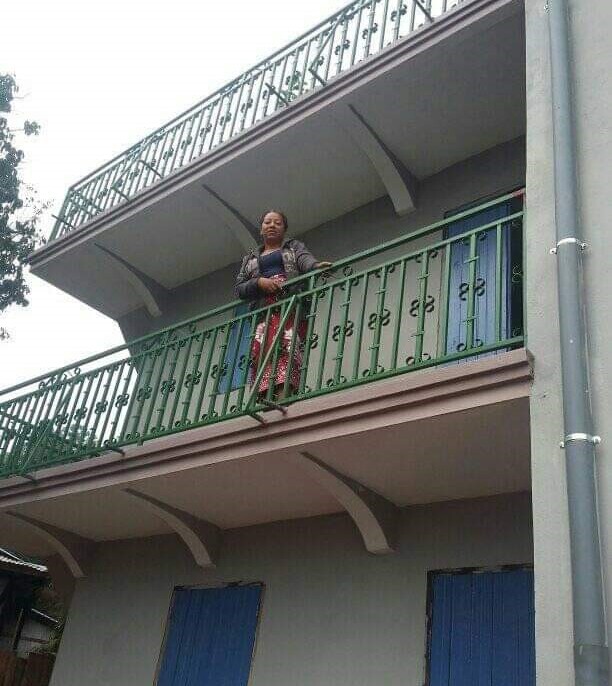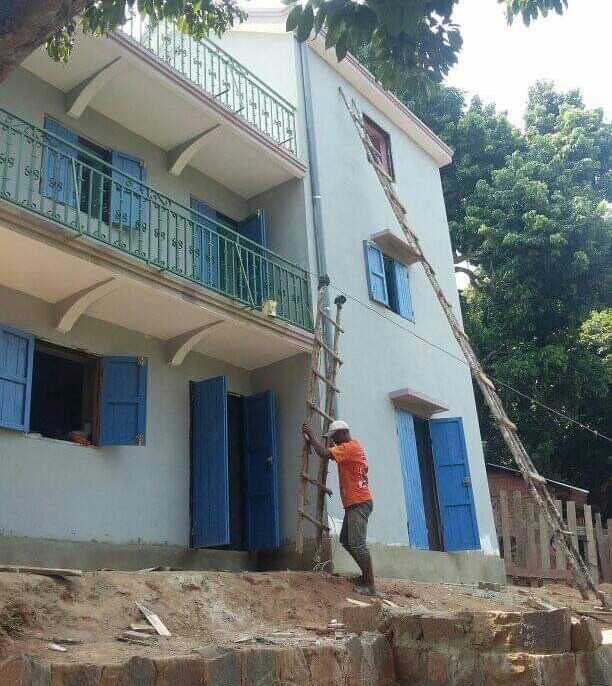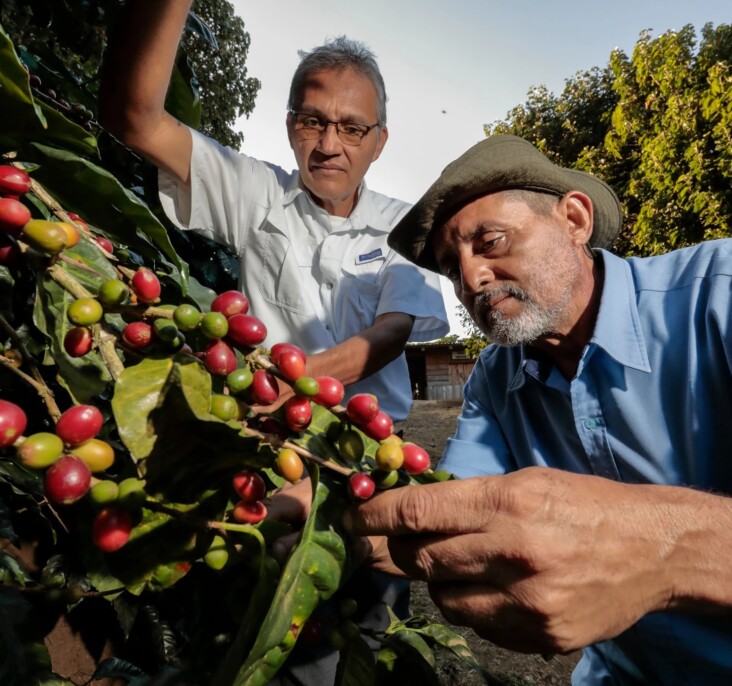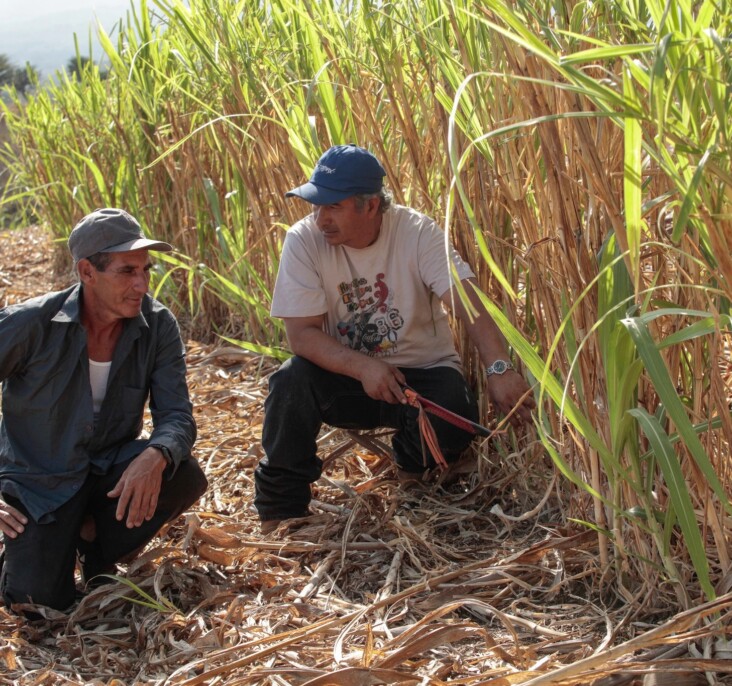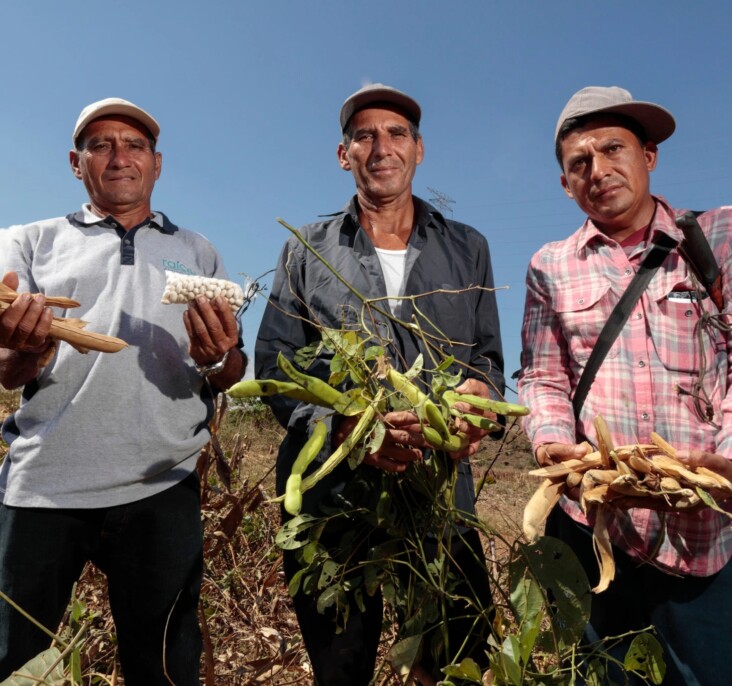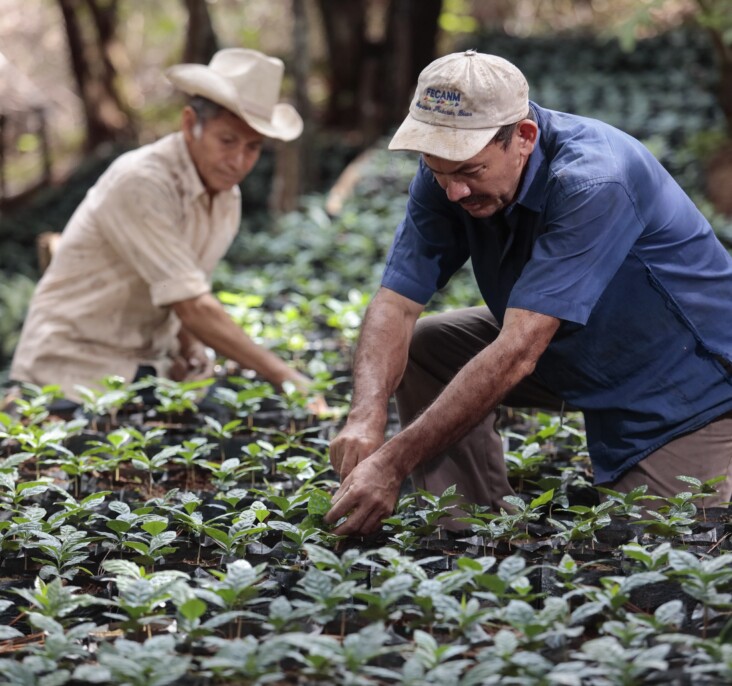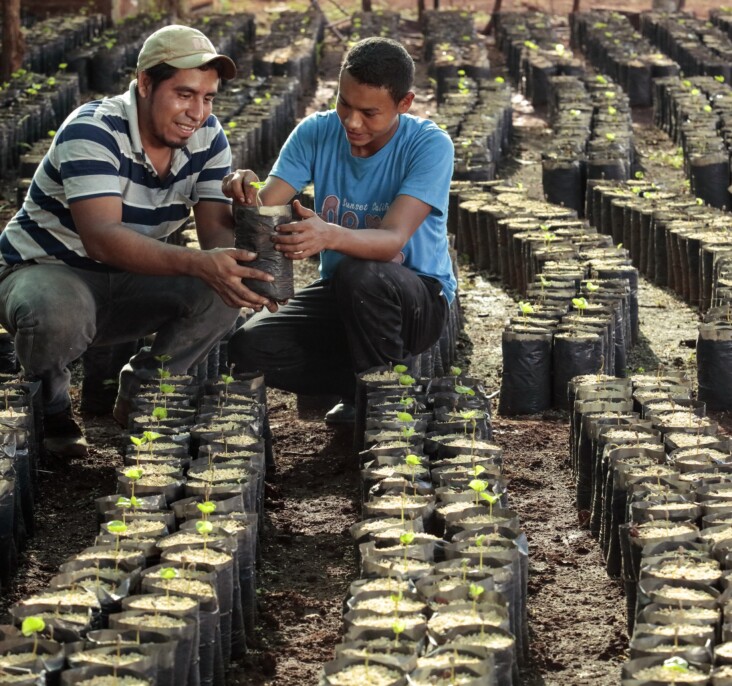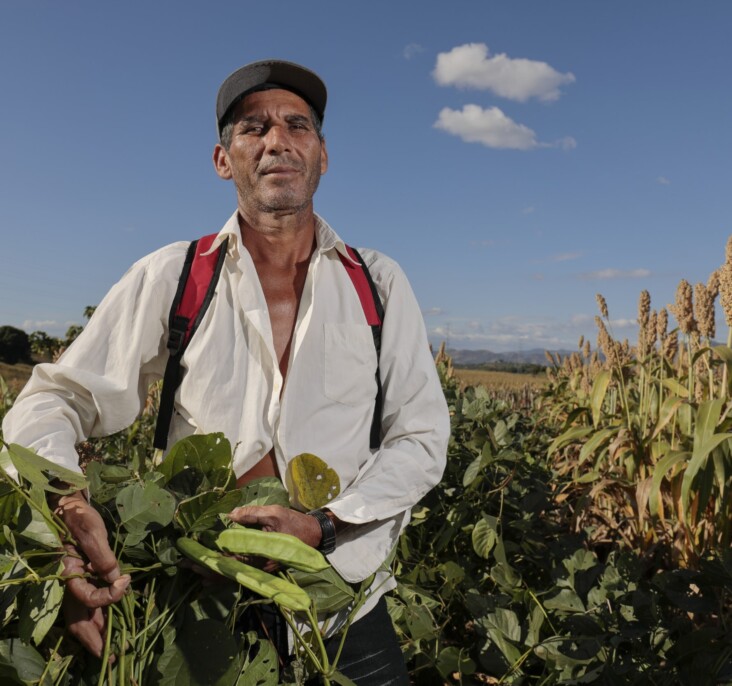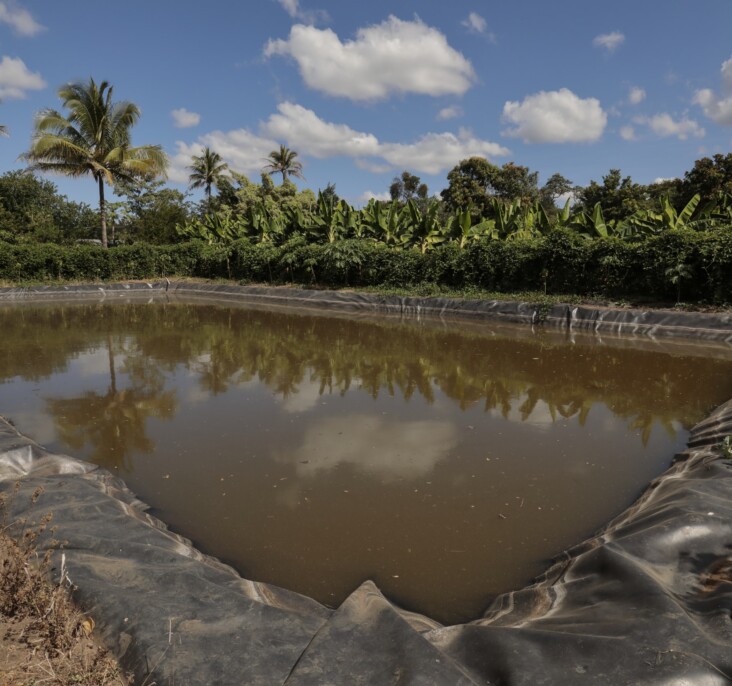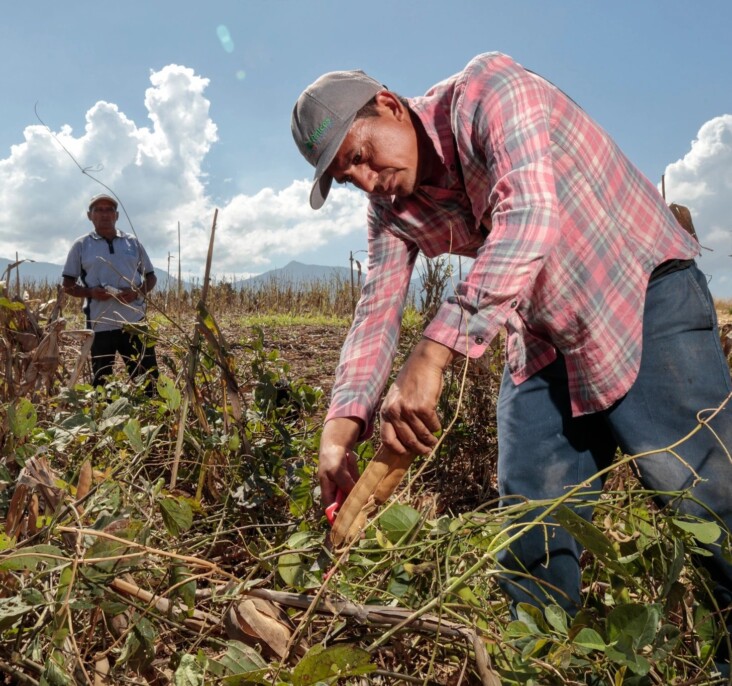In a thick rainforest in Southeast Madagascar, Félicité Raminosoa farms more than 50 acres of vanilla, bananas, coffee and rice. She was taught traditional farming techniques from her late father but still struggled to make a sufficient living for her family. On top of that, the rainforest she loves is quickly disappearing.
Madagascar is a place unique in the world for its biodiversity, but it has lost 75% of that dynamic rainforest. Land is cleared by farmers who grow unsustainable, low value crops that fetch diminishing returns and barely keep their families fed.
Before he passed away, Félicité’s father introduced the family to vanilla—a crop with enormous potential. But the family didn’t have the knowledge or equipment to process it. In 2015, Félicité enrolled in a month-long CRS training course in curing and cultivation techniques. Soon after, her family acquired the necessary equipment to process their vanilla. After processing, the price of one kilogram of vanilla rises from $7 to $55—a life-changing increase to Félicité’s family income. But vanilla is an environmental boon too. It grows better in the shade of a healthy rainforest. Planting trees, instead of cutting them down, is part of farming vanilla.
Since her training, Félicité has become a leader in her community. She trains unemployed young people and local farmers in what she refers to as “the art of vanilla.” A member of multiple collectives that encourage community involvement in tree nurseries and vanilla curing, Félicité works to spread awareness across Madagascar about sustainable agriculture and the ways farmers can not only coexist with nature but benefit financially from it.
“It takes patience to grow products that are abundant and of good quality,” Félicité says. “But it is very good money.”
She’s used her vanilla profits to build a new home for her family—one closer to the local school. “I told my children to look at the house and acknowledge such blessing each time they have doubts or lack of motivation to navigate life and its duties,” Félicité says. “I told them if they believe in themselves enough to make concrete steps toward their dreams, blessings can be as huge as this house or even more.”
She has also sent coffee samples, upon request, to a CRS partner company in Switzerland and hopes to establish an export business in the future.
The Need Is Global
The world’s poorest families depend on largely traditional farming for food and income. Félicité’s story is an example of how farm-dependent families can find success in a challenging environment by relearning agricultural norms.
Small-scale farmers like Félicité—half of whom are women—grow 70% to 80% of the world’s food. Far too many live and work land too degraded to meet their needs. Over the past 40 years, more than 30% of the world’s farmland has become unproductive.
Healthy farms are inseparable from healthy lives. Studies have shown that land degradation has crippling ripple effects throughout communities. It exacerbates poverty and hunger, contributes to unemployment, triggers migration and displacement, and escalates conflict.
But CRS has a solution. Over the next 10 years, we will scale proven models to transform livelihoods and landscapes worldwide by restoring four million acres of land and helping one million people overcome poverty. To help farmers transition from basic food crops to high value crops, we will introduce agroforestry systems like those Félicité has implemented on her farm. Working with farms and community partners, we’ll reforest land and preserve unique wildlife while vastly improving incomes for farmers.
To build resilience among farmers in changing climates, we will introduce water-smart agricultural techniques. We’ll stop soil erosion and revitalize rainwater capture systems to restore watersheds in hilly areas and regreen drylands by bringing trees back to life and nurturing healthy root systems.
“I feel we are giving a new face to agriculture,” says Daniel Torres, field manager for CRS’ Raíces Ahuachapán project in El Salvador. Raíces is working to restore over 30,000 acres of degraded land in El Salvador’s western department, while improving farm productivity and engaging local youth.
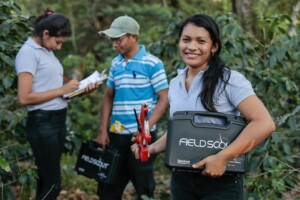
“We are growing crops that can both improve soils and lower production costs. Farmers have an opportunity to develop and become sustainable.” El Salvador, like Madagascar, is among the most deforested countries in the world. Unsustainable farming practices like overgrazing, agricultural burning and chemical fertilization have left 75% of the country’s farmland so depleted that it can’t retain water and vital nutrients.
The good news is that we can restore soil health and recharge groundwater. This people-centered approach empowers farmers to make change on their own land—honoring the dignity of work and the care for God’s creation that Catholic social teaching calls us to do.
High Hopes and Healthy Profits
“Before, we burned our lands with fire and poison. We were burning our Mother Earth, who feeds us. We were killing ourselves out there,” says Andrés Velasquez Bravo, a farmer in rural El Salvador who has transformed his farm with help from CRS. “Little by little, you make progress.”
“Already today, with this approach to agriculture and conservation, we have been able to change the face of the environment,” Daniel says. Farmers are learning to manage their water supplies by capturing rainwater and using natural barriers to prevent runoff and erosion. Measures like cover cropping—planting a second, low-growing crop among staple crops—maximize groundcover and lock in moisture. Crops grown this way are better able to survive droughts. Education about availability of green alternatives to toxic fertilizers help farmers improve soil fertility and yields.
Andrés is already teaching his neighbors to adopt the agricultural practices that have brought him increased yields, decreased costs and safer conditions. But not all local farmers have changed their ways. “Their crops are stunted. You can see the difference between our fields,” he says. “The hope is that all my neighbors do it. We can change our lives.”
Andrés has been a farmer for 20 years, but has never before seen such healthy crops and high profits. Using farming techniques he learned from CRS, he says he spent 15% less and harvested 35% more.
Spending Less and Getting More
Julio Velasquez Bravo has been a farmer in Ahuachapán, El Salvador, for 15 years. Using traditional techniques, he struggled to make ends meet. He frequently lost his crops to drought, which was becoming an increasingly common threat. When he learned of CRS’ water-smart agriculture training, he enrolled, and quickly put his lessons into practice on his land.
Julio was also met with skepticism from his neighbors, “They told me I was crazy,” he says. Now he has become an example for his fellow producers. “They are able to see that it worked.”
We are protecting the soil and seeing more development, and thicker and greener crops.”
—Julio Velasquez Bravo
Julio used to harvest 15,000 pounds worth of crops from his land each year. After one year of utilizing water-smart practices, he has reaped 30,000 pounds. He has saved money too, by eliminating harsh chemical fertilizers. “We used to spend $780 a year, now we spend just $635,” he says. “We have spent less and gotten more.”
Julio’s crops survived in the face of erratic weather. “When a 15-day drought comes, the crop does not dry, and before it did,” he says. “Quite a few friends have asked me if they can get in. I tell them, ‘Yes!’ They should do everything we are doing.”
Julio is looking forward to the future. “Thank God we have seen a big difference. Everyone is happy. This year was good,” he says. “Next year will be even better.”
Becoming a Leader
The link between land and life is clear. Farmers are poised to lead the way to a healthier, more productive agricultural sector. CRS puts the farmer first to ensure smart agriculture will grow organically throughout the region and the world. “Today, with the issue of climate change, you have to be resilient,” Daniel says. “Perhaps the most important thing is to see the faces of the farmers, who are winning. They feel that this is changing their lives.”
Alex Umberto Godinez Alvarado has been a farmer for 12 years. He enrolled in CRS’ water-smart agricultural training only to improve his yields and provide for his family. What he found was his place as a leader in the community.
As his production improved and his crops survived drought after drought, his peers took interest in his new practices. He began to share his knowledge. He showed fellow producers how to save money on organic fertilizer, forgoing toxic chemicals that damage the soil. He taught them how to protect their harvests from drought with cover cropping. “I am a spokesperson in the community,” he says.
“They are excited to hear the way we are working—to see they can have better profit.” Alex defines a leader as a person who shares knowledge and imparts skills to the community. “I would consider myself to be a leader now,” he says.
Click here to learn more about water-smart agriculture in El Salvador.
